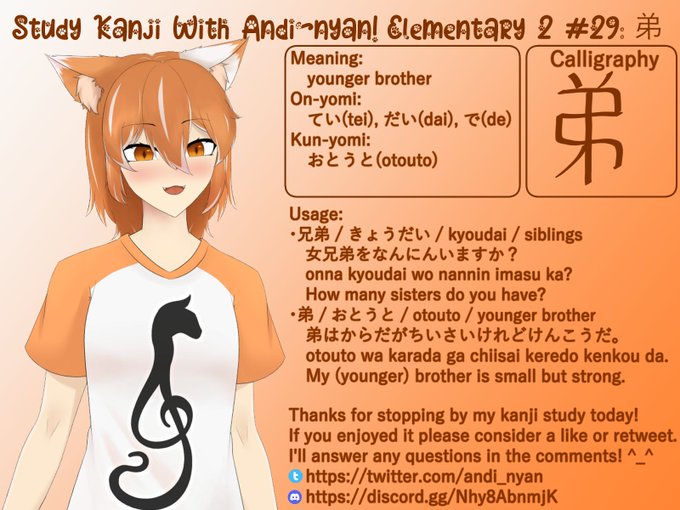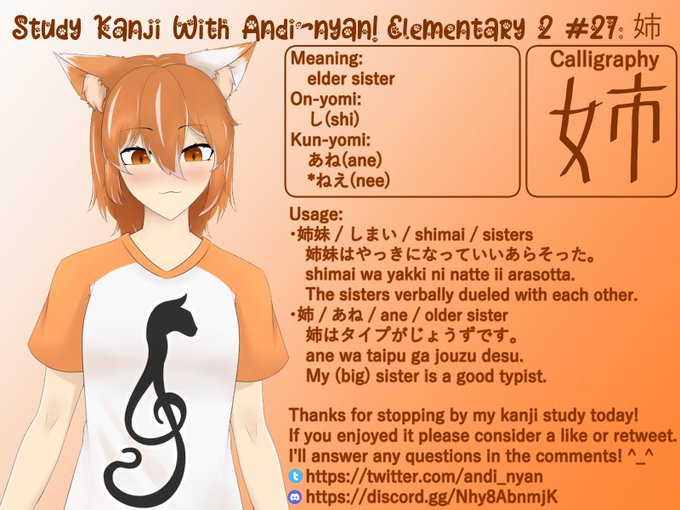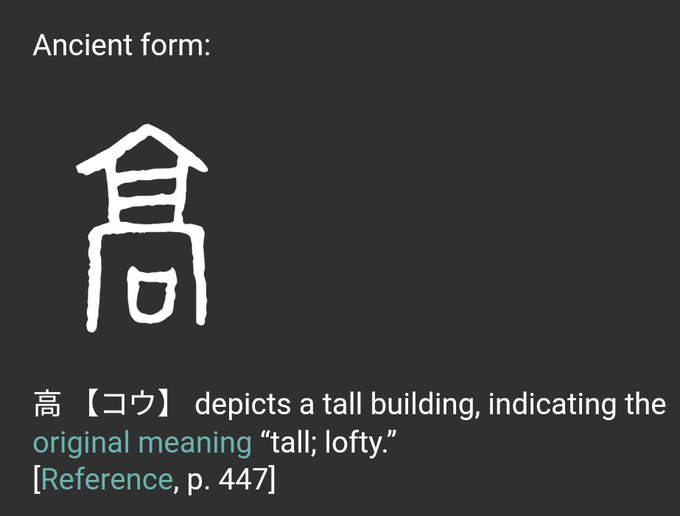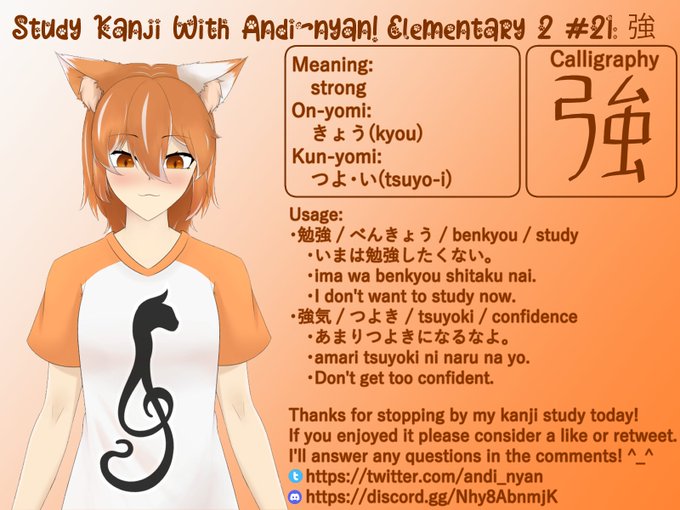kanjisのTwitterイラスト検索結果。 214 件中 6ページ目
ようこそ!
Today's #kanjistudy features 毛, hair/fur! It can also refer to feathers or down.
And that's a good way to remember this kanji - think of it as looking like a feather!
Thanks for visiting, and またにゃ!
#ENVtuber #VtuberTwP
ようこそ!
My #kanjistudy for today features 体, body.
I'm not quite sure why it incorporates the kanji for book, 本, though it looks like it might have been one of the less common meanings instead.
にゃりがとう、みんにゃ!またにゃ!
#ENvtuber #VtuberTwP
+ como "¡Oh, mi amor no-correspondido!" 😀. Importante a aclarar: la frase es bastante simple y NO suele tener sentidos platónicos. "Kataomoi" es usado románticamente ya que tiene los kanjis "片" (Una parte, sólo de un lado) y "思い" (Sentimientos, amor).
ようこそ to my #kanjistudy! Today I feature 友, friend.
The kanji itself depicts two hands, representing friendship. I think it's safe to say that they're clasped together, and this is an elegant way to show the concept. ^_^
Thanks for coming, and またね!
#ENVtuber #VTuberTwP
ようこそ! Today's #kanjistudy is 自, oneself!
Lots to unpack in this kanji - it's the concept of 'self'. It can mean yourself, myself, himself, herself, etc. Easy to remember, too, an eye 目 with a lash. Quite a useful kanji!
Thanks for visiting, またね!
#ENVtuber #VtuberTwP
ようこそ! My #kanjistudy for today features 妹, younger daughter!
Even though it's not actually the radical for tree, 木, I can't help but see this kanji as a girl who climbs trees. It helps me remember the kanji at least. ^_^
#ENVtuber #VtuberTwP
ようこそ!
Today's #kanjistudy features 弟, younger brother.
I found it interesting that there's no particular similarity between 兄 and 弟, and it turns out that 弟 originally meant something completely different.
にゃりがとう、みんにゃ! またにゃ!
#ENVtuber #VtuberTwP
Continuing with my #kanjistudy, here's the next in the sequence, 兄, or older brother!
Thankfully, this one is pretty memorable - a mouth (口) with a pair of legs attached. Do big brothers being talkative cross cultures?
Thanks for reading, またにゃ!
#ENVtuber #VTuberTwP
Welcome to my #kanjistudy! Today's is 姉, older sister.
There's a fairly easy way to remember this kanji - it has 女, female, and 市, market, so a girl who can go to the market by herself. ^_^
にゃりがとう、みんにゃ!またにゃ!
#ENVtuber #VtuberTwP
For today's #kanjistudy, I'm featuring 父, father!
Like with 母, you use ちち for your own father and とうさん for someone else's father. I'm not really sure why both kanji have this irregular reading, it's pretty neat!
Thanks for stopping by, またにゃ!
#ENVtuber #VtuberTwP
Hello and welcome to my #kanjistudy featuring 母, mother!
A couple notes here. はは is your own mother, while かあさん is someone else's mother. Also, the readings with * are not formally associated with 母.
にゃりがとう、みんにゃ!またにゃ!
#ENVtuber #VtuberTwP
Welcome to my #kanjistudy, today I'm featuring 親, parent!
I like how this uses 立, 木, 見 (stand, tree, see), and I remember it as "a child has to stand in a tree to look their parents in the eye".
にゃりがとう、みんにゃ!またにゃ!
#ENVtuber #VtuberTwP
こんにちにゃ! Today's #kanjistudy is 同, same!
This kanji is used in a lot of compounds to mean "the same (something)", which I didn't realize until I went over it just now. Kanji are really interesting that way. ^_^
にゃりがとう、みんにゃ!またにゃ!
#ENVtuber #VtuberTwP
Welcome to my #kanjistudy featuring 高, tall!
I think of this kanji as several things stacked on top of each other, but the ancient form depicts a tall building. It's stayed pretty similar to the ancient form, actually!
にゃりがとう、みんにゃ!またにゃ!
#ENVtuber #VtuberTwP
Hello and welcome to my #kanjistudy on 強, strong!
I've always thought of the component on the right resembling a stag beetle, believed to be one of the strongest of insects, so it helps me with remembering the kanji. ^_^
にゃりがとう、みんにゃ!またにゃ!
#ENVtuber #VtuberTwP
Thanks for stopping by my 100th #kanjistudy! Today I'm featuring 弱, weak!
This is a pretty distinct kanji and fairly easy to remember. It's actually related to the kanji for strong, 強, up next! ^_^
にゃりがとう、みんにゃ!またね!
#ENVtuber #VtuberTwP
Whoops! I forgot to send this #kanjistudy out with the tags. My bad. I'll fix that now.
So today I featured 矢, arrow.
I've had the chance to use a bow before. It's pretty challenging!
にゃりがとう、みんにゃ!またね!
#ENVtuber #VtuberTwP
Welcome to my #kanjistudy featuring 矢, arrow!
It was actually pretty hard to find a sentence for this that wasn't just talking about actual arrows.
Hello and welcome to my #kanjistudy, everynyan! Today I'm covering 線,, line or track.
This is a really elegant kanji - it consists of 糸, thread, 白, white, and 水, water. Exactly what's needed to describe a trail!
ありがとう、みんあ!またね!
#ENVtuber #VtuberTwP
I present to you my latest #kanjistudy featuring 直!
I find it interesting that this kanji, which is used for a straight line, also gets used for concepts like 'honesty' and 'fix', similar to English. Some concepts transcend language!
ありがとう、みんあ!
#ENVtuber #VtuberTwP






















